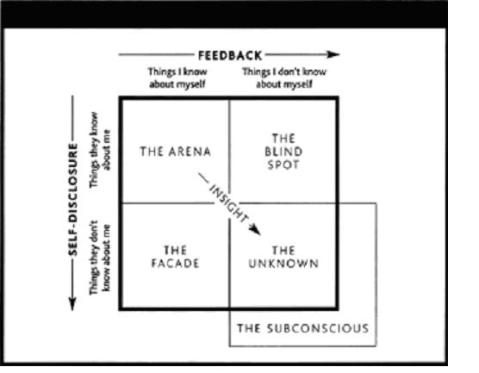Can you see your own junk? This scale will reveal a lot about where you’re are in terms of your ability to self-observe and get out of your own way. Miami University (Stiles et al., 1990) – Edited by Kit Hill, Ed.D. LMFT
- Warded off/dissociated. Leader is unaware of the problem; the problematic voice is silent or dissociated. Affect may be minimal, reflecting successful avoidance.
- Unwanted thoughts/active avoidance. Leader prefers not to think about the

Johari Window ~ Dynamic Version
experience. Problematic voices emerge in response to coach interventions or external circumstances and are suppressed or avoided. Affect is intensely negative but episodic and unfocused; the connection with the content may be unclear.
- Vague awareness/emergence. Leader is aware of a problematic experience but cannot formulate the problem clearly. Problematic voice emerges into sustained awareness. Affect includes acute psychological pain or panic associated with the problematic material.
- Problem statement/clarification. Content includes a clear statement of a problem–something that can be worked on. Opposing voices are differentiated and can talk about each other. Affect is negative but manageable, not panicky.
- Understanding/insight. The problematic experience is formulated and understood in some way. Voices reach an understanding with each other (a meaning bridge). Affect may be mixed, with some unpleasant recognition but also some pleasant surprise.
- Application/working through. The understanding is used to work on a problem. Voices work together to address problems of living. Affective tone is positive, optimistic.
- Resourcefulness/problem solution. The formerly problematic experience has become a resource, used for solving problems. Voices can be used flexibly. Affect is positive, satisfied.
- Integration/mastery. Leader automatically generalizes solutions; voices are fully integrated, serving as resources in new situations. Affect is positive or neutral (i.e., this is no longer something to get excited about).